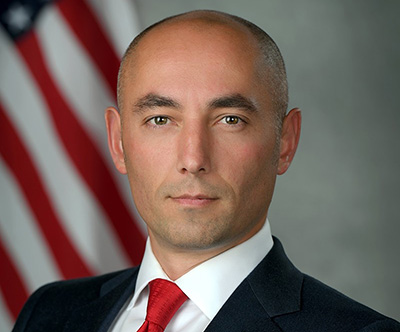Dennis Chornenky, former senior advisor and strategy consultant in artificial intelligence (AI) and emerging technology for the White House, has been named chief AI advisor to UC Davis Health.

In this newly created key role, Chornenky will be leading efforts to establish an AI strategy and governance framework that ensures the UC Davis health system's approach to AI is safe and ethical. Additionally, he will assure all AI efforts meet emerging regulatory compliance standards.
"AI holds tremendous potential in improving access to care, reducing clinician burnout and in fast-tracking research. Dennis is a nationally recognized leader in AI with an impressive track record of bringing organizations together so they can realize the full benefits of this transformative technology, said Ashish Atreja, chief information officer and chief digital health officer. "We are excited to have him at UC Davis Health and build an open-innovation model of validated AI that supports patients, faculty, researchers as well as our academic and industry partners."
Chornenky is an executive with more than 20 years of leadership and business strategy at the intersection of healthcare and advanced technology, with a focus on AI strategy and governance. His experience includes senior roles at the White House, UnitedHealth Group, and Morgan Stanley.
As a senior advisor and presidential innovation fellow at the White House, Chornenky led initiatives on artificial intelligence policy, digital health, and national security across two administrations. As senior vice president and chief AI officer at UnitedHealth Group's Optum Health, he developed an AI governance framework and managed a portfolio of AI applications for clinical and business environments.
Chornenky has also served as an investment banker at Morgan Stanley and Lazard, as a startup CEO, and as an executive advisor to healthcare and technology organizations, federal agencies, and startups. As a data scientist and epidemiologist, he has delivered dozens of AI projects for large organizations and conducted pioneering research on digital therapeutic models and responsible AI at Harvard Medical School and the MIT Analytics Lab.
Chornenky holds a Bachelor of Arts in Political Science from UC Berkeley, a Master of Business Administration from the University of Oxford, Saïd Business School, and a Master of Public Health from the Harvard T.H. Chan School of Public Health, where he was trained as an epidemiologist and clinical data scientist. He also holds a Master of Science in Management of Technology and Business Analytics from the MIT Sloan School of Management, where he was a Sloan Fellow in Global Leadership and Innovation.
UC Davis Health's new chief AI advisor recently shared about his excitement to join the health system, his career experience and his thoughts on the power of AI.
Why did you decide to come to UC Davis Health?
I really respect the people and culture at UC Davis Health. I am excited to collaborate with David Lubarsky, Ashish Atreja, Ron Amodeo and many of other folks I have had the pleasure to meet.
UC Davis Health is a great academic medical center that does some of the world's best research and I believe it is timely for us to get serious about building a foundation for more advanced technologies and AI strategy. With everything we have been seeing in generative AI capabilities, with language models and Chat GPT – it is as good of a time as ever to explore how we can increase the use of this technology to improve patient care.
There has been a lot of focus recently on AI, what are your thoughts on the potential use of this technology?
Initially I think AI really can help us interact with data and computers in more natural ways especially with large language models becoming so capable. Language is the most natural way we interact with others, so providing a provider or patient an easier modality to interact with data and complex computer systems will save time.
Also, I believe AI is going to help us create better and more advanced analytic capabilities which will help us identify the onset of disease earlier. This will provide patients earlier interventions, better outcomes, better continuity of care and more connected devices to allow continuous monitoring that will reduce re-admissions and improve recovery.
How have your career experiences influenced your path to UC Davis Health?
I believe my career experiences have lined up nicely to lead me to this point.
My career has taken me to a few different areas but has always touched on healthcare in some way. I started out in finance as an investment banker, but even then, a lot of the investments that we made were into the healthcare space. So, I've been tracking healthcare companies and healthcare organizations for healthcare technology for a long time.
Then I wanted to do something more entrepreneurial, so I developed my own AI driven telehealth and smart scheduling company out of Palo Alto for several years. It really was a deep dive at the intersection of those technologies and using data to try to identify which patients would be the most likely to engage in and benefit from telehealth as an added modality of care.
I have also done a good deal of consulting for large health care organizations, technology organizations and then I had the opportunity to work for the federal government.
At this White House, I originally came on to advise on AI strategy and AI policy. I worked on exploring how we could cultivate growth and innovation in the private sector and how we could create better data science capabilities with the federal government.
Then the pandemic hit, and I went back to my experience with telehealth. I'm a trained epidemiologist, so the intersection of epidemiology and telehealth suddenly became an extremely important part of the pandemic response. So, it was that experience that brought me back to the intersection of healthcare and advanced technologies.






